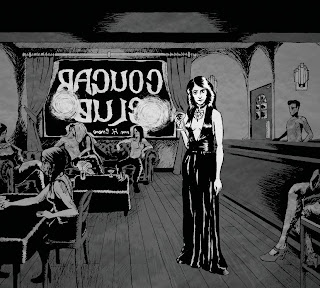Richmond, Virginia may be a city better known for its blues, country,
and bluegrass music and the Richmond Folk Festival than for heavy
metal, but if you delve into the murky underground scene, you will
realise that it is home to some incredible bands, including occult
misery veterans Cough who need no introduction, suffice
to say that they have been peddling their own unique strain of
despairing, cacophonous sludge and doom since 2005. The remote scene
that spawned Cough also gave birth to doom upstarts Windhand whose
practice room demo, and last year’s debut album, have made them
ones-to-watch in the US metal underground. The ties between the two
bands (which now includes sharing a bass-player in Chandler Parker) come
to the fore on this split release put out by Relapse Records which is
comprised of two new Windhand cuts and one mini-epic from Cough.
Cough‘s contribution, “Athame”, is a nasty, spiteful
occult anthem of grief, despair, and “ritual suicide”, shaking its
tar-blackened death rattle slowly across your ear for 19 minutes.
Languishing at a pace like the drip of Chinese water torture, Cough
envelope you under their cloak and the darkness doesn’t let up as vast,
dark waves of guitars, seismic drums and Parker’s gut-wrenching vocals
entrance you into a depressive stupor.
Comparatively Windhand are, no pun intended, a
breath of fresh air, if for no reason other than Dorthia Cottrell’s
lofty – dare-I-say, uplifting – vocals. “Amaranth” gets to work
immediately and is instantly more uproarious than any moment on Side A,
the main riffs propelled with more energy making it clear that
Windhand’s aim is slightly more skyward-facing than Cough’s
introspective, consuming approach. “Shepherd’s Crook” almost feels like a
slowed-down and stretched-out take on “Amaranth” but this allows
Cottrell to lay more of the infectious vocal hooks that made their last
EP so enjoyable on us. As ever with Windhand, it’s the authenticity and
style with which they deliver their music as opposed to any large sense
of originality that will appeal to the out-in-the-open or closeted
Sabbath fans out there but Windhand are instantly recognisable and
always thoroughly enjoyable.
All this leads one to wonder if this is the year of split releases?
With a handful of excellent splits already under 2013′s metaphorical
belt and at least a few more due before year end, ‘Reflection Of The
Negative’ is as good an argument for the vitality of the format as any,
presenting two geographically remote bands who both have differing and
kick-arse interpretations of doom. Whether this split is intended as a
taster for future releases for both bands on Relapse Records or not,
it’s clear that the future is looking good for Cough and Windhand.
[Originally published by the Sleeping Shaman, 25/04/2013]
http://www.thesleepingshaman.com/reviews/album-reviews/c/cough-windhand-reflection-of-the-negative-split-cd-lp-dd-2013/






